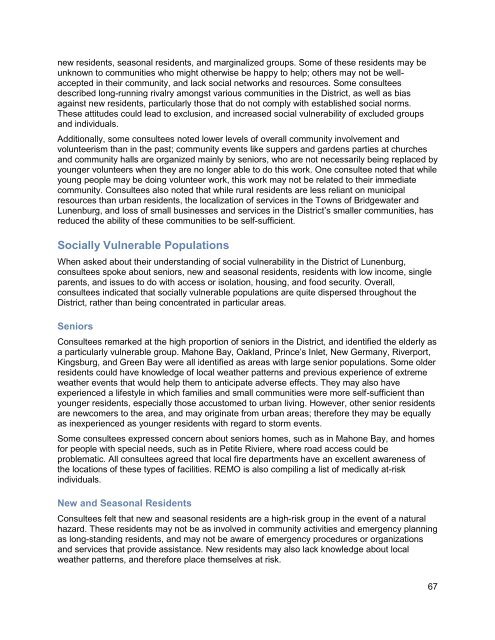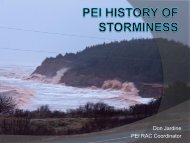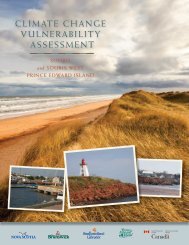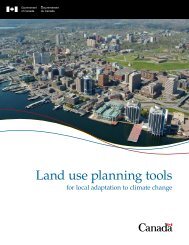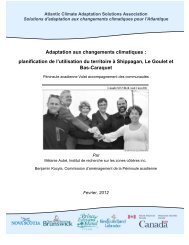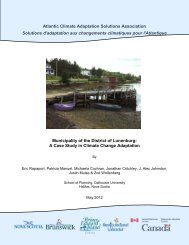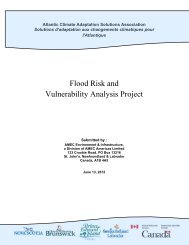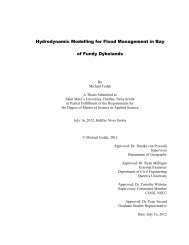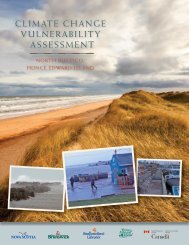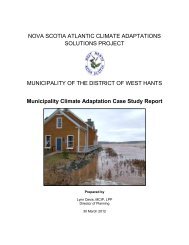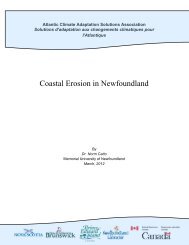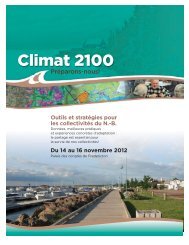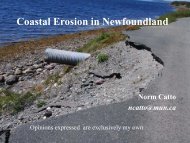Lunenburg Part 2 - Section 5 - Social Vulnerability - August 30.pdf
Lunenburg Part 2 - Section 5 - Social Vulnerability - August 30.pdf
Lunenburg Part 2 - Section 5 - Social Vulnerability - August 30.pdf
Create successful ePaper yourself
Turn your PDF publications into a flip-book with our unique Google optimized e-Paper software.
new residents, seasonal residents, and marginalized groups. Some of these residents may be<br />
unknown to communities who might otherwise be happy to help; others may not be wellaccepted<br />
in their community, and lack social networks and resources. Some consultees<br />
described long-running rivalry amongst various communities in the District, as well as bias<br />
against new residents, particularly those that do not comply with established social norms.<br />
These attitudes could lead to exclusion, and increased social vulnerability of excluded groups<br />
and individuals.<br />
Additionally, some consultees noted lower levels of overall community involvement and<br />
volunteerism than in the past; community events like suppers and gardens parties at churches<br />
and community halls are organized mainly by seniors, who are not necessarily being replaced by<br />
younger volunteers when they are no longer able to do this work. One consultee noted that while<br />
young people may be doing volunteer work, this work may not be related to their immediate<br />
community. Consultees also noted that while rural residents are less reliant on municipal<br />
resources than urban residents, the localization of services in the Towns of Bridgewater and<br />
<strong>Lunenburg</strong>, and loss of small businesses and services in the District’s smaller communities, has<br />
reduced the ability of these communities to be self-sufficient.<br />
<strong>Social</strong>ly Vulnerable Populations<br />
When asked about their understanding of social vulnerability in the District of <strong>Lunenburg</strong>,<br />
consultees spoke about seniors, new and seasonal residents, residents with low income, single<br />
parents, and issues to do with access or isolation, housing, and food security. Overall,<br />
consultees indicated that socially vulnerable populations are quite dispersed throughout the<br />
District, rather than being concentrated in particular areas.<br />
Seniors<br />
Consultees remarked at the high proportion of seniors in the District, and identified the elderly as<br />
a particularly vulnerable group. Mahone Bay, Oakland, Prince’s Inlet, New Germany, Riverport,<br />
Kingsburg, and Green Bay were all identified as areas with large senior populations. Some older<br />
residents could have knowledge of local weather patterns and previous experience of extreme<br />
weather events that would help them to anticipate adverse effects. They may also have<br />
experienced a lifestyle in which families and small communities were more self-sufficient than<br />
younger residents, especially those accustomed to urban living. However, other senior residents<br />
are newcomers to the area, and may originate from urban areas; therefore they may be equally<br />
as inexperienced as younger residents with regard to storm events.<br />
Some consultees expressed concern about seniors homes, such as in Mahone Bay, and homes<br />
for people with special needs, such as in Petite Riviere, where road access could be<br />
problematic. All consultees agreed that local fire departments have an excellent awareness of<br />
the locations of these types of facilities. REMO is also compiling a list of medically at-risk<br />
individuals.<br />
New and Seasonal Residents<br />
Consultees felt that new and seasonal residents are a high-risk group in the event of a natural<br />
hazard. These residents may not be as involved in community activities and emergency planning<br />
as long-standing residents, and may not be aware of emergency procedures or organizations<br />
and services that provide assistance. New residents may also lack knowledge about local<br />
weather patterns, and therefore place themselves at risk.<br />
67


